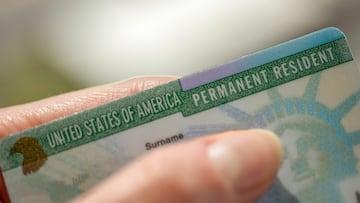How migrants in the US who have a green card can be deported
Foreigners with a Green Card can legally reside and work in the U.S., but they are not exempt from deportation.

The permanent resident card, commonly known as a Green Card, allows foreign nationals to legally live and work in the United States. However, while it grants significant benefits and protections, Green Card holders can still be deported under certain circumstances.
According to the United States Citizenship and Immigration Services (USCIS), a person retains the rights associated with their Green Card “as long as they do not commit any action that could result in deportation or removal under immigration law.”
In other words, failure to comply with Green Card regulations can lead to revocation, loss of permanent residency, and potential deportation. Below are the main reasons the U.S. government may revoke a Green Card and deport its holder.
Reasons how foreigners can lose their Green Card
Section 237 of the Immigration and Nationality Act (INA) outlines the grounds for deportation of lawful permanent residents. These range from committing certain crimes to remaining outside the United States for an extended period.
Some of the key reasons authorities may revoke a Green Card include:
- Committing crimes involving drugs, firearms, murder, assault, kidnapping, or domestic violence.
- Committing fraud during the Green Card application process, such as entering into a sham marriage.
- Illegally voting or claiming to be a U.S. citizen.
- Encouraging, assisting, or helping another person enter the United States unlawfully.
- Engaging in smuggling, human trafficking, drug addiction–related offenses, domestic violence, stalking, document or record falsification, or terrorist activities.
- Being convicted of a criminal offense.
- Escaping from an immigration checkpoint or custody.
A foreign national can also lose their Green Card if they intentionally abandon their permanent resident status — for example, by moving to another country with the intent to live there permanently or by declaring themselves a “nonimmigrant” on their tax returns. Spending an extended period of time outside the United States can also be considered evidence of abandonment and lead to revocation of permanent residency.
In addition, the U.S. government may initiate a rescission process within the first five years after granting a Green Card if it determines that the individual was not actually eligible for permanent residence at the time the application was approved.
Related stories
If a person’s lawful permanent resident status is revoked for any of these reasons, they lose their Green Card and may be placed in removal (deportation) proceedings.
Get your game on! Whether you’re into NFL touchdowns, NBA buzzer-beaters, world-class soccer goals, or MLB home runs, our app has it all. Dive into live coverage, expert insights, breaking news, exclusive videos, and more – plus, stay updated on the latest in current affairs and entertainment. Download now for all-access coverage, right at your fingertips – anytime, anywhere.


Complete your personal details to comment